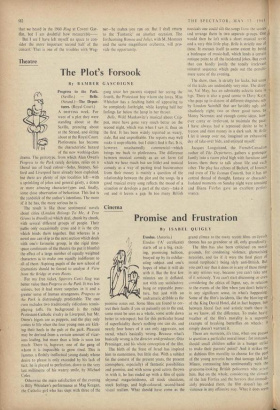Theatre
The Plot's Forsook
By BAMBER GASCOIGNE Progress to the Park. (Saville.) — Belle. (Strand.)—The Depar- tures. (Royal Court.) A DRIFTING week. For want of a plot they were standing about at the Saville, prancing about at the Strand, and sitting about at the Royal Court.
Plotlessness has become the characteristic hazard of the new working-class drama. The prototype, from which Alun Owen's Progress to the Park rarely deviates, relies on a liberal use of local colour—Soho, Stepney, Sal- ford and Liverpool have already been exploited, but there are plenty of ripe localities left—with a sprinkling of jokes and general gaiety, a dozen or more amusing character-types and, finally, some close observation of behaviour. This last is the yardstick of the author's intentions. The more of it he has, the more serious he is.
The result is like those sentimental novels about cities (London Belongs To Me, A Tree Grows in Brooklyn) which deal, chunk by chunk, with several different groups of people. Their paths only occasionally cross and it is the city which binds them together. But whereas in a novel one can skip to the next section which deals with one's favourite group, in the rigid time- space continuum of the theatre (to put it bluntly) the effect of a large number of equally weighted characters is to make one equally indifferent to all of them. Aspiring pupils of the new school of dramatists should be forced to analyse A View front the Bridge or even Roots.
For my free ticket, Sparrers Can't Sing was better value than Progress to the Park. It was less serious, but it had more surprises in it and a greater sense of human strangeness. Progress to the Park is distressingly predictable. The cast even includes two traditionally ridiculous tennis- playing toffs. Its background is the rabid Protestant-Catholic rivalry in Liverpool, but Mr.
Owen's bigots are as puppets, and the play only comes to life when the four young men are kick- ing their heels in the pub or the park. Pleasure may be derived from a certain amount of vicar- ious loafing, but more than a little is soon too much. There -is, hogwever, one of the gang of whom it is impossible to grow tired. This is Jammo, a fleshily ineffectual young dandy whose desire to please is only exceeded by his lack of tact; he is played to perfection, down to the very last millimetre of his watery smile, by Michael Coles.
Otherwise the main satisfaction of the evening is Billy YVhitelaw's performance as Mag Keegan, the Catholic girl who has slept with three of the gang since her parents stopped her seeing the fourth, the Protestant boy whom she loses. Miss Whitelaw has a fetching habit. of appearing to he completely forthright, while keeping half her feelings far below the lump in her throat.
Belle, Wolf Mankowitz's musical about Crip- pen, must have gone very much better on the second night, which was when I saw it, than on the first. It has been widely reported as weary, stale, flat and unprofitable. The reports may well make it unprofitable, but I didn't find it flat. It is, however, unashamedly commercial—which brings me back to plotlessness. The difference between musical comedy as an art form (of which we hear much but see little) and musical comedy as a way of parting tired businessmen from their money is mainly a question of the relationship between the plot and the songs. In a good musical every song reflects the mood of a situation or develops a part of the story—take it out and it leaves a gap. In too many British musicals one could sift the songs from the scenes and arrange them in two separate groups. One if would then be left with a short musical revue and a very thin little play. Belle is strictly one of these. It excuses itself to some extent by being a burlesque of music-hall, which lends a certain antique point to all the incidental jokes. But even that can hardly justify the totally irrelevant minstrel sequence which pads out the penulti- mate scene of the evening.
The show, then, is strictly for kicks, but some of the kicks are undeniably very nice. The direc- tor, Val May, has an admirably eclectic taste in !cgs. There is also a good comic in Davy K*e, who pops up in dozens of different disguises: sets by Loudon Sainthill that are lavishly ugly and absolutely right; two or three good tunes by Monty Norman; and enough comic ideas, how- ever corny or irrelevant, to maintain the pace. I have always had a repressed desire to be a tycoon and mint money in a dark suit. At Belle I let it sweep over me, imagined an exhausting day of take-over bids, and enjoyed myself.
Jacques Languirand, the French-Canadian author of The Departures, gathers a grotesque family into a room piled high with furniture and leaves them there to talk about life and each other. The play has echoes of Beckett, of lonesco and even of The Iceman Cometh, but it has 110 central thread of thought, fantasy or character. Isolated moments on Sunday night were amusing and Diana Fairfax gave an excellent perfor- mance.






































 Previous page
Previous page